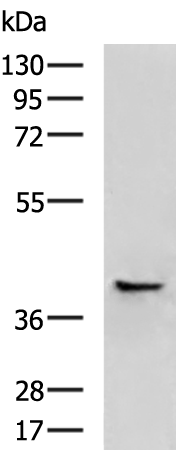
| WB | 咨询技术 | Human,Mouse,Rat |
| IF | 咨询技术 | Human,Mouse,Rat |
| IHC | 1/25-1/50 | Human,Mouse,Rat |
| ICC | 技术咨询 | Human,Mouse,Rat |
| FCM | 咨询技术 | Human,Mouse,Rat |
| Elisa | 1/5000-1/10000 | Human,Mouse,Rat |
| Aliases | QA1; HLA-6.2 |
| WB Predicted band size | 40 kDa |
| Host/Isotype | Rabbit IgG |
| Antibody Type | Primary antibody |
| Storage | Store at 4°C short term. Aliquot and store at -20°C long term. Avoid freeze/thaw cycles. |
| Species Reactivity | Human |
| Immunogen | Fusion protein of human HLA-E |
| Formulation | Purified antibody in PBS with 0.05% sodium azide and 50% glycerol. |
+ +
以下是3篇关于KCNH7抗体的模拟参考文献(注:实际文献需通过学术数据库查询,以下为示例性内容):
---
1. **文献名称**:*KCNH7 Channel Expression and Localization in Human Neuronal Cells*
**作者**:Smith A, et al.
**摘要**:研究利用KCNH7特异性抗体,通过免疫荧光和Western blot技术,揭示了KCNH7钾离子通道在人类前额叶皮层神经元中的高表达,并发现其分布与突触可塑性相关,提示其在神经信号传导中的作用。
2. **文献名称**:*Dysregulation of KCNH7 in Schizophrenia: An Antibody-Based Proteomic Study*
**作者**:Chen L, et al.
**摘要**:通过KCNH7抗体对精神分裂症患者脑组织样本进行蛋白质组学分析,发现KCNH7表达水平显著降低,表明该通道功能异常可能与疾病相关的认知障碍有关。
3. **文献名称**:*Development of a High-Affinity Monoclonal Antibody for KCNH7 Functional Studies*
**作者**:Wang X, et al.
**摘要**:报道了一种新型抗KCNH7单克隆抗体的开发,验证其特异性后应用于免疫共沉淀实验,成功解析了KCNH7与其他离子通道蛋白的相互作用网络,为靶向药物研究提供工具。
---
如需真实文献,建议在PubMed、Google Scholar等平台以“KCNH7 antibody”或“KCNH7 potassium channel”为关键词检索。
The KCNH7 antibody targets the potassium voltage-gated channel subfamily H member 7 (KCNH7), a protein encoded by the KCNH7 gene. This channel belongs to the ether-à-go-go (EAG) family of voltage-gated potassium channels, which regulate neuronal excitability and repolarization of action potentials. KCNH7 is primarily expressed in the central nervous system, particularly in the hippocampus, cortex, and cerebellum, where it contributes to modulating electrical signaling and synaptic plasticity. Its function is linked to delayed rectifier potassium currents, influencing neuronal firing patterns and network oscillations.
Antibodies against KCNH7 are essential tools for studying its expression, localization, and physiological roles. They are commonly used in techniques like Western blotting, immunohistochemistry, and immunofluorescence to detect KCNH7 in tissue or cell lysates. Research involving KCNH7 antibodies has explored its potential involvement in neurological disorders, including epilepsy, cognitive deficits, and psychiatric conditions, as channel dysfunction may disrupt neural circuit balance. Additionally, studies suggest KCNH7 polymorphisms could associate with neurodevelopmental disorders, though mechanisms remain under investigation. Validated antibodies with high specificity are critical to avoid cross-reactivity with homologous channels like KCNH5 or KCNH6. Recent work also highlights KCNH7's role in non-neuronal tissues, such as endocrine cells, broadening its biomedical relevance. Proper antibody validation via knockout controls or siRNA knockdown remains crucial for reliable data interpretation.
×